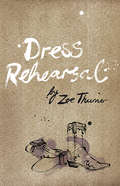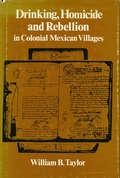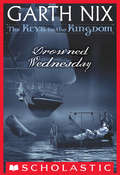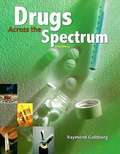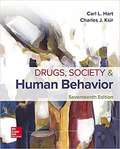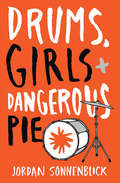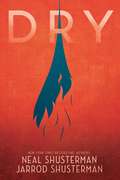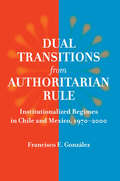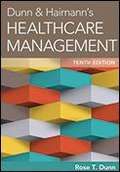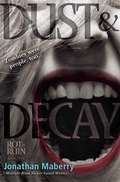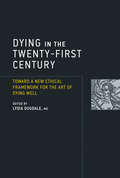- Table View
- List View
Dreams Come to Life (Bendy)
by Adrienne KressDon't miss the pulse-pounding graphic novel adaptation of the bestselling young adult novel, Bendy: Dreams Come to Life. Based on the hit indie video game series, Bendy!Seventeen-year-old Buddy has spent most of his life trying to escape the Lower East Side slums of New York City. Working as a delivery boy to support his family, Buddy wants to become an artist, a dream he's sure will never be realized. But that all changes when a delivery job puts him face-to-face with Mr. Joey Drew, the eccentric owner of an animation studio. Mr. Drew takes Buddy under his wing as an apprentice, thrusting him into a world unlike anything Buddy has ever seen before.But not everything at the studio is as picture-perfect as it seems . . . Something is going bump in the night at Joey Drew Studios, something that leaves behind trails of thick, dark ink. While the studio frantically works toward their latest deadline, Buddy and Dot, the writing intern, team up to find out just what is tormenting the studio after-hours, even if it means tracking the trail to Mr. Drew himself.Fans won't want to miss this horrifying graphic novel adaptation packed with panels that are sure to haunt your nightmares!
Dreams Lie Beneath
by Rebecca RossFrom Rebecca Ross, the #1 New York Times bestselling author of Divine Rivals, comes a story about magic, vengeance, and the captivating power of dreams. A must-read for fans of Stephanie Garber, Olivie Blake, and Isabel Ibañez.The realm of Azenor has spent years plagued by a curse. Every new moon, magic flows from the nearby mountain and brings nightmares to life. Only magicians—who serve as territory wardens—stand between people and their worst dreams.Clementine Madigan is ready to take over as the warden of her small town, but when two magicians arrive to challenge her father for his domain, she is unknowingly drawn into a century-old conflict. She seeks revenge, but as she gets closer to Phelan, one of the vexingly handsome young magicians, secrets—as well as romance—begin to rise.Clementine must unite with Phelan to fight the realm’s curse, which seems to be haunting their every turn. But will their efforts be enough to save Azenor from the nightmares that lurk around every corner?
Dreams of Archives Unfolded: Absence and Caribbean Life Writing (Critical Caribbean Studies)
by Jocelyn Fenton StittThe first book on pan-Caribbean life writing, Dreams of Archives Unfolded reveals the innovative formal practices used to write about historical absences within contemporary personal narratives. Although the premier genres of writing postcoloniality in the Caribbean have been understood to be fiction and poetry, established figures such as Erna Brodber, Maryse Condé, Lorna Goodison, Edwidge Danticat, Saidiya Hartmann, Ruth Behar, and Dionne Brand and emerging writers such as Yvonne Shorter Brown, and Gaiutra Bahadur use life writing to question the relationship between the past and the present. Stitt theorizes that the remarkable flowering of life writing by Caribbean women since 2000 is not an imitation of the “memoir boom” in North America and Europe; instead, it marks a different use of the genre born out of encountering gendered absences in archives and ancestral memory that cannot be filled with more research. Dreams of Archives makes a significant contribution to studies of Caribbean literature by demonstrating that women’s autobiographical narratives published in the past twenty years are feminist epistemological projects that rework Caribbean studies’ longstanding commitment to creating counter-archives.
Dreams of Eagles (Eagles #2)
by William W. JohnstoneFrom the greatest western writers of the 21st century, the classic second adventure in The Eagles, one of the most iconic and beloved sagas of the American frontier, is back in print as legendary Scottish frontiersman Jamie MacCallister blazes through the Wild West.In peace and war, he was the soul of a nation—and the flesh and blood of the American Frontier . . . It was a virgin land of vast horizons. . .a land of dreams and dust and blood, where men sought glory and hope died hard. But for Jamie Ian MacCallister, who'd grown to manhood among Indians and fought at the Alamo, war and wilderness were home . . . and survival was a way of life. From the battlegrounds of Texas to the Colorado Rockies and the goldfields of California, Jamie MacCallister was one of a handful of daring pioneers blazing trails in the American West. Joining famed frontiersman Kit Carson on the first U.S. Army expedition from Missouri to the wide Pacific, he forged a future in a dawning era of greatness and greed that would stain the pages of history with blood—and make men like MacCallister into legends.
Dress Rehearsal
by Zoe ThurnerLara Pearlman loves acting, cream on her muffins, and her best friend Oggy. She also may be falling in love with Blake Taylor, the cute boy from school with a dubious past. In an attempt to get closer to Blake, Lara joins him in the cast of a school play. Her plans, however, backfire as she ends up battling Oggy and the flirty Chelsea Wilson for his attention. Among love triangles and an increasingly strange school production, events turn sinister and Lara has to decide where her loyalties lie. Sure to appeal to anyone who has ever dreamed of being an actor or had a crush on an unattainable boy, this witty novel offers plenty of action as well as a positive message about being confident in oneself.
Dressed to Kill
by Charlotte MadisonMy fingers close around the trigger. I pause for a split second to think about the bullets I am about to spray across the ground. After today, I'll no longer be the new girl.'Captain Charlotte Madison is blonde, beautiful and flies Apache helicopters for a living. She has completed two tours of duty in Afghanistan and is currently fighting on the frontline in her third. DRESSED TO KILL shows us what life is like for a girl in a resolutely male-dominated environment. But she isn't just a woman in a man's world, she's a woman women aspire to be - glamorous as well as brave, and beating the men at their own game. Only a tiny percentage of people can multi-task to the extreme level the aircraft demands, and most airmen who try to qualify as an Apache pilot fail. Full of the exciting, adrenaline-filled action that has made other military memoirs so successful, DRESSED TO KILL is also unique. A highly intelligent and brilliant young woman, Charlotte is Britain's first female Apache pilot, and the first British female pilot to kill in an Apache. We have, quite simply, never seen the landscape of 21st-century frontline conflict from a perspective like hers. DRESSED TO KILL will appeal to anyone interested in current affairs, but it will also speak to a whole generation of young women who will relate to 27-year-old Charlotte in a way they never imagined possible.
Drew Pendous Escapes from Treasure Island (Drew Pendous #4)
by Cool School Drew PendousStory time turns into battle time as Drew Pendous and Ms. Booksy get pulled into Treasure Island and must fight their way out!The Cool School YouTube channel is a sensation, with more than one million subscribers! We all get drawn into our favorite books—but it literally happens to Drew Pendous and Ms. Booksy when they read Treasure Island together. Then nasty Captain Hooksy adds a Cruel School twist that will trap them in the story forever. Can Drew and his Mighty Pen Ultimate save the day when they&’re forced to face a crew of mean pirates?
Drew Pendous Travels to Ancient Egypt (Drew Pendous #2)
by Cool School Drew PendousJoin Stupendous Drew Pendous on an adventure back in time, where he must stop Ray Blank from erasing history!The Cool School YouTube channel is a sensation, with more than one million subscribers! When the Cool School takes a field trip to the art museum, they notice something strange: the Sphinx is missing his nose! Drew Pendous uses his Mighty Pen Ultimate to sketch a time machine, and he and Ella travel back to ancient Egypt to investigate. It turns out Drew&’s evil twin Ray Blank has rewritten history by erasing the nose! Can Drew and Ella stop Ray and set the timeline straight? This very young graphic novel is lots of fun!
Drew Pendous Versus Ray Blank (Drew Pendous #3)
by Cool School Drew PendousDrew Pendous may have his Mighty Pen Ultimate—but his evil twin Ray Blank has a Magic Eraser. Who will win out when Drew&’s trapped at Cruel School?The Cool School YouTube channel is a sensation, with more than one million subscribers! It&’s April Fool&’s Day, and Drew decides to trick everyone at Cool School by dressing up as his evil twin Ray Blank. But his joke goes awry: Ms. Booksy thinks he&’s really Ray and traps him in Cruel School! Then Ray steals Drew&’s Mighty Pen Ultimate so Drew can&’t even draw his way out. Will Drew manage to escape . . . or must he stay in Cruel School forever?
Drew Pendous and the Camp Color War (Drew Pendous #1)
by Cool School Drew PendousIt&’s camp color war—but Grace Cale is sabotaging the games by stealing all the color! Can Drew find a way to stop her?The Cool School YouTube channel is a sensation, with more than one million subscribers! It&’s Camp Cool School vs. Camp Cruel School in color war. Let the games begin! Even though Cruel School students love to cheat, it looks like Team Cool will rule the day . . . until Grace Cale arrives determined to suck all the colors out of the world. Can Drew use teamwork—and his drawing skills—to stop her evil plot? This very young graphic novel is lots of fun!
Drink, Drugs and Dependence: From Science to Clinical Practice
by Woody Caan Jackie De BellerocheAt a world level addiction and the fall-out from substance use is affecting more and more lives. Professionals are increasingly being confronted with puzzling, multifaceted aspects of substance use, whether they work in a clinic, the laboratory or the community.If you are a member of any caring profession, sooner or later you will encounter problems caused by drugs, alcohol and tobacco. In order to understand substance use and substance users, no single discipline can provide all the answers. In a novel way, this book integrates biological science, social science and clinical experience. It draws together contributions from experts in these diverse and rapidly growing fields, providing the reader with a deeper capacity to engage with problems effectively.Drink, Drugs and Dependence includes thought-provoking examples, illustrations and test questions to support problem-based learning. Designed to be read consecutively or as a reference text, it will be a welcome resource for all those working in the field of addiction.
Drinking, Homicide, and Rebellion in Colonial Mexican Villages
by William B. TaylorThis book is about patterns of social behavior in Indian peasant communities of central and southern Mexico after the severe hazards of the sixteenth century had passed, leaving the pressures of a mature colonial system on the lives of an expanding population. Without attempting to force connections among peasant norms, behavior, and circumstances, I am interested in what colonial peasants believed and said about themselves, what they actually did and said in specific situations, and what their relations were to the powerful outsiders whose presence defined their position as peasants.
Dropping Beats
by Nathanael Lessore"Funny, bursting with heart, goofy, wise, and did I mention– wildly wonderfully funny." —Jon Scieszka, First National Ambassador of Young People's Literature and Founder of Guys ReadA hilarious and heartfelt young YA comedy about the misadventures of an aspiring young rapper as he navigates school, family, and friendship. Thirteen-year-old Growls (aka Shaun) is an aspiring (awful) rapper who hopes to enter this year&’s Raptology competition with his best friend, Shanks (aka Zachariah). After all, what better way to land his crush (Tanisha) and get the respect he finally deserves than winning the contest and going viral? But when a livestream practice goes epically wrong, the two friends do go viral– and not in the way they&’d hoped. Now the laughingstock of the school, Growls is sure he&’ll never have another chance to date Tanisha. Even worse, Shanks has gone MIA, leaving him terribly alone. But when Growls meets the new girl on the block (Siobhan), things don&’t seem so terrible after all. And with some patience, a little luck, and a whole lot of practice, he just might win the Raptology competition and be a hero to both Siobhan and Shanks. Either way, he&’s ready for this. He&’s steady for this. It&’s comeback season and they call him comeback king for a reason.
Drowned Wednesday: Drowned Wednesday (The Keys to the Kingdom #3)
by Garth NixThe third spellbinding book in bestselling author Garth Nix's magical Keys to the Kingdom series.The next spellbinding book in best-selling author Garth Nix's magical Keys to the Kingdom series.Everyone is after Arthur Penhaligon. Strange pirates. Shadowy creatures. And Drowned Wednesday, whose gluttony threatens both her world and Arthur's. With his unlimited imagination and thrilling storytelling, Garth Nix has created a character and a world that become even more compelling with each book. As Arthur gets closer to the heart of his quest, the suspense and mystery grow more and more intense. . . .
Drugs Across the Spectrum (6th edition)
by Raymond GoldbergIn this undergraduate textbook, Goldberg (State U. of New York at Cortland) surveys the physiological, psychological, and sociological literature on the use and abuse of licit and illicit drugs. Opening chapters provide an overview of drugs in contemporary society, motivations for drug use, drugs and the law, and the pharmacology and physiology of drug use. The psychological and physiological effects of drugs are then explored in individual chapters covering alcohol; tobacco; narcotics; sedative-hypnotic drugs; psychotherapeutic drugs; stimulants (cocaine, amphetamines, and caffeine); marijuana; and over-the-counter drugs. A final pair of chapters summarizes the research on substance abuse treatment and drug prevention and education. Annotation ©2005 Book News, Inc., Portland, OR (booknews.com)
Drugs in Sport (Third Edition)
by David MottramDrug use and abuse represents perhaps the most profound and high-profile issue facing sport today. Each major international championship seems to deliver a new drug-related controversy, while drug takers and sports administrators attempt to out-manoeuvre each other with new substances and new testing procedures.Drugs in Sport - 3rd Editionis a fully revised and updated version of the most comprehensive and authoritative text available on the subject. Leading figures in the field explore the hard science behind every major class of drug, as well as the social, ethical and organisational dimensions to the issue.Key topics include:* analysis of all the key substances, including anabolic steroids, EPO and human growth hormone* alcohol and social drug use in sport* creatine and nutritional supplements* evidence and issues around doping control in sport.This is a highly accessible text for all sports science and sports studies students, coaches and professional sports people, and sports administrators and policy-makers.
Drugs, Society, and Human Behavior
by Carl L. Hart Charles J. KsirDrugs, Society and Human Behavior provides the latest information on drug use and its effects on society as well as on the individual. Trusted for more than 40 years by both instructors and students, this authoritative resource examines drugs and drug use from a variety of perspectives―behavioral, pharmacological, historical, social, legal, and clinical. The 17th Edition includes the very latest information and statistics and many new timely topics and issues have been added that are sure to pique students’ interest and stimulate class discussion.
Drums, Girls, and Dangerous Pie
by Jordan SonnenblickA brave and beautiful story that will make readers laugh, and break their hearts at the same time. Now with a special note from the author!Steven has a totally normal life (well, almost).He plays drums in the All-City Jazz Band (whose members call him the Peasant), has a crush on the hottest girl in school (who doesn't even know he's alive), and is constantly annoyed by his younger brother, Jeffrey (who is cuter than cute - which is also pretty annoying). But when Jeffrey gets sick, Steven's world is turned upside down, and he is forced to deal with his brother's illness, his parents' attempts to keep the family in one piece, his homework, the band, girls, and Dangerous Pie (yes, you'll have to read the book to find out what that is!).
Dry
by Neal Shusterman Jarrod Shusterman&“The authors do not hold back.&” —Booklist (starred review) &“The palpable desperation that pervades the plot…feels true, giving it a chilling air of inevitability.&” —Publishers Weekly (starred review) &“The Shustermans challenge readers.&” —School Library Journal (starred review) &“No one does doom like Neal Shusterman.&” —Kirkus Reviews (starred review) When the California drought escalates to catastrophic proportions, one teen is forced to make life and death decisions for her family in this harrowing story of survival from New York Times bestselling author Neal Shusterman and Jarrod Shusterman.The drought—or the Tap-Out, as everyone calls it—has been going on for a while now. Everyone&’s lives have become an endless list of don&’ts: don&’t water the lawn, don&’t fill up your pool, don&’t take long showers. Until the taps run dry. Suddenly, Alyssa&’s quiet suburban street spirals into a warzone of desperation; neighbors and families turned against each other on the hunt for water. And when her parents don&’t return and her life—and the life of her brother—is threatened, Alyssa has to make impossible choices if she&’s going to survive.
Dual Transitions from Authoritarian Rule: Institutionalized Regimes in Chile and Mexico, 1970–2000
by Francisco E. González2008 Outstanding Academic Title, Choice MagazineLatin America's region-wide 1982 economic collapse had a drastic effect on governments throughout Central and South America, leading many to the verge of failure and pushing several of the most stridently authoritarian—Argentina, Bolivia, Brazil, and Uruguay—over the brink. Surprisingly though, Chile's repressive military dictatorship and Mexico's hegemonic civilian regime endured amid the economic chaos that rocked the region. Dual Transitions from Authoritarian Rule explains why the regimes in these two nations survived the financial upheaval of the early 1980s and how each progressed toward a more open, democratic, market-driven system in later years. Using an in-depth comparative analysis of Chile and Mexico, Francisco González explains that the two governments—though quite different ideologically—possessed a common type of institutionalized authoritarian rule that not only served to maintain the political status quo but, paradoxically, also aided proponents of political and economic liberalization. Featuring a discussion of parallel phenomena in Brazil, Hungary, Taiwan, and South Korea, Dual Transitions from Authoritarian Rule presents a cogent challenge to the received wisdom that sociopolitical and economic change within authoritarian nations must be approached separately. This book will interest scholars of Latin American politics, democratization studies, market reform, and comparative politics and international relations.
Dungeons and Drama
by Kristy BoyceNATIONAL BESTSELLER • When it comes to romance, sometimes it doesn't hurt to play games. A fun YA romcom full of fake dating hijinks! A COSMOPOLITAN BEST YOUNG ADULT BOOK OF THE YEARNo one loves musicals more than Riley Morris—her dream is to be a Broadway director. But when the spring show is canceled, Riley has to figure out a way to bring it back. Easier said than done—she&’s stuck working at her dad&’s game store. The place that means more to him than his family does.Riley can't waste time at a dead-end job when her entire future is resting on making a name for herself. So she convinces her co-worker Nathan Wheeler—the floppy-haired, glasses-wearing guy she barely knows from school—to help her. In exchange, she&’ll help him make his gamer-girl crush jealous. Plus it won&’t hurt to show her egotistical ex, Paul, just what he&’s missing without her.Soon Riley and Nathan are &“a couple,&” and people seem to believe it. But selling the ruse means joining Nathan&’s role-playing game. To Riley&’s surprise, the game is almost fun. And even more surprising, flirting with Nathan doesn&’t require as much acting as she thought it would. . . .And don't miss Kristy Boyce's Dating and Dragons, out now!
Dunn and Haimann's Healthcare Management
by Rose T. DunnThe challenges facing the healthcare industry today will require fine-tuned managerial skills. Healthcare managers must keep pace with revolutionary and sophisticated breakthroughs in medical science and technology, transparency of service outcomes and charges, an educated customer base, an aging population, and federal regulations growing exponentially. At the center of all these changes is the supervisor, who has to bring and hold together the human resources, physical facilities, professional expertise, technologies, and other support systems necessary to provide care and monitor services rendered. In addition, these tasks have to be accomplished within the fiscal constraints of a more efficient healthcare system. Therefore, healthcare managers and supervisors must understand the complexities of the organization, generational motivational differences, regional healthcare demands, and the industry as a whole.
Dust & Decay: Rot And Ruin; Dust And Decay; Dead And Gone, A Rot And Ruin Story; Flesh And Bone (Rot & Ruin #2)
by Jonathan Maberry“The zombie attacks are bigger, better—and gorier—in this nearly non-stop action sequel to Rot & Ruin” (Kirkus Reviews). Winner of the Bram Stoker Award.Six months have passed since the terrifying battle with Charlie Pink-eye and the Motor City Hammer in the zombie-infested mountains of the Rot & Ruin. It’s also been six months since Benny Imura and Nix Riley saw something in the air that changed their lives. Now, after months of rigorous training with Benny’s zombie-hunter brother Tom, Benny and Nix are ready to leave their home forever and search for a better future. Lilah the Lost Girl and Benny’s best friend Lou Chong are going with them. But before they even leave there is a shocking zombie attack in town, and as soon as they step into the Rot & Ruin they are pursued by the living dead, wild animals, insane murderers, and the horrors of Gameland—where teenagers are forced to fight for their lives in the zombie pits. Worst of all…could the evil Charlie Pink-eye still be alive? In the great Rot & Ruin, everything wants to kill you. And not everyone in Benny’s small band of travelers will survive….
Dying in the Twenty-First Century: Toward a New Ethical Framework for the Art of Dying Well (Basic Bioethics)
by Lydia DugdalePhysicians, philosophers, and theologians consider how to address death and dying for a diverse population in a secularized century.Most of us are generally ill-equipped for dying. Today, we neither see death nor prepare for it. But this has not always been the case. In the early fifteenth century, the Roman Catholic Church published the Ars moriendi texts, which established prayers and practices for an art of dying. In the twenty-first century, physicians rely on procedures and protocols for the efficient management of hospitalized patients. How can we recapture an art of dying that can facilitate our dying well? In this book, physicians, philosophers, and theologians attempt to articulate a bioethical framework for dying well in a secularized, diverse society.Contributors discuss such topics as the acceptance of human finitude; the role of hospice and palliative medicine; spiritual preparation for death; and the relationship between community, and individual autonomy. They also consider special cases, including children, elderly patients with dementia, and death in the early years of the AIDS epidemic, when doctors could do little more than accompany their patients in humble solidarity.These chapters make the case for a robust bioethics—one that could foster both the contemplation of finitude and the cultivation of community that would be necessary for a contemporary art of dying well.ContributorsJeffrey P. Bishop, Lisa Sowle Cahill, Daniel Callahan, Farr A. Curlin, Lydia S. Dugdale, Michelle Harrington, John Lantos, Stephen R. Latham, M. Therese Lysaught, Autumn Alcott Ridenour, Peter A. Selwyn, Daniel Sulmasy
Dying to Count: Post-Abortion Care and Global Reproductive Health Politics in Senegal (Medical Anthropology)
by Siri SuhDuring the early 1990s, global health experts developed a new model of emergency obstetric care: post-abortion care or PAC. In developing countries with restrictive abortion laws and where NGOs relied on US family planning aid, PAC offered an apolitical approach to addressing the consequences of unsafe abortion. In Dying to Count, Siri Suh traces how national and global population politics collide in Senegal as health workers, health officials, and NGO workers strive to demonstrate PAC’s effectiveness in the absence of rigorous statistical evidence that the intervention reduces maternal mortality. Suh argues that pragmatically assembled PAC data convey commitments to maternal mortality reduction goals while obscuring the frequency of unsafe abortion and the inadequate care women with complications are likely to receive if they manage to reach a hospital. At a moment when African women face the highest risk worldwide of death from complications related to pregnancy, birth, or abortion, Suh’s ethnography of PAC in Senegal makes a critical contribution to studies of global health, population and development, African studies, and reproductive justice.




